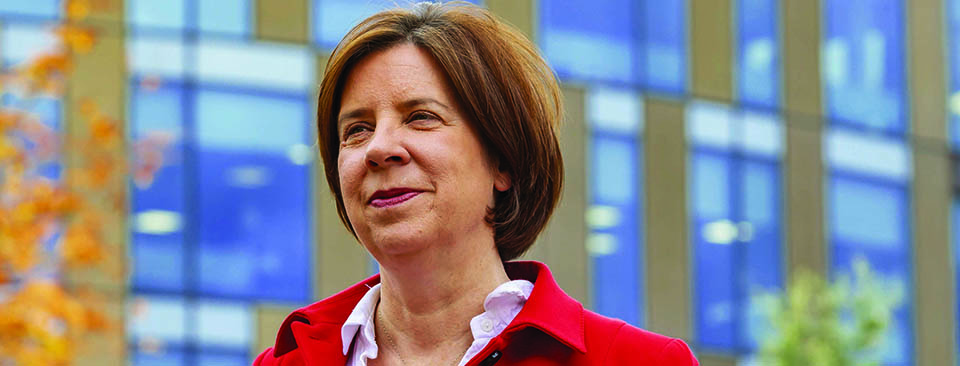
DPP Catherine Pierse
(Pic: Cian Redmond)
Director of Public Prosecutions Catherine Pierse has commenterd on the ever-increasing significance of EU legislation and case-law in prosecutors’ day-to-day work.
A rough estimate of the Irish Statute Book suggests that around 80% of new domestic substantive and procedural criminal legislation now originates in the EU, the DPP said in her address at the annual National Prosecutors’ Conference (15 November).
More is on the way, coinciding with Ireland’s Presidency of the Council of the EU in the second half of 2026, the DPP added.
Novel EU initiative
The DPP highlighted the E-evidence Regulation and Directive (E-evidence package) as a particularly novel EU initiative.
Coming into force in August 2026, this will allow orders for production of evidence to be sent directly to Internet service providers (ISPs) across the EU.
The service providers will be obliged to respond directly and within tight time limits.
“I was at a discussion recently about the planning that Ireland is doing in the lead in to implementing this new EU initiative.
“Aisling Kelly, formerly a prosecutor in the Office of the DPP but now a general counsel in Microsoft, made the point that, whether we like it or not, we are all data lawyers now,” the DPP said.
“Not only are we all data lawyers now but we are also now all EU criminal law practitioners.”
A lot of work is happening at a policy level here in Ireland on instruments such as e-evidence, transfer of proceedings and a programme for Government commitment to opt in to the European Public Prosecutors Office, the DPP continued.
“Once these new instruments are operationalised, they will become very relevant to each of you in your day-to-day work,” the DPP told delegates at the conference.
Transfer of proceedings regulation
The Office of the DPP is focused on building its capacity to engage with colleagues in the Department of Justice and in Brussels on the operational impact of proposed EU instruments, and to work collaboratively across the criminal justice system to ensure their successful implementation.
“The negotiations around the Transfer of Proceedings Regulation [Regulation (EU) 2024/3011] is a good example of Irish officials successfully communicating how Ireland can optimally cooperate, as the final text of the regulation took account of the division of labour between law enforcement and prosecutors in common law systems,” the DPP noted.
“It is important of course to also remain realistic about the scope for influencing EU instruments, where there are 26 other member states also involved in the discussions, and understand that ultimately our system will need to also adapt to our EU reality.”
Features of our common-law system
As a small common-law country post Brexit, Ireland needs to think creatively about this, she added.
For example, one of the features of a common-law system is that there is a very strong emphasis on primacy of oral evidence; on the need to have a witness present in court and available for cross-examination.
Inquisitorial systems
“We need to be conscious that in many other EU jurisdictions with more inquisitorial systems, rights are protected in a different way – for example by ensuring greater judicial oversight in relation to the taking of evidence during an investigation,” the DPP said.
Another important feature of our more adversarial common law system is a strong focus on proving provenance and authenticity of evidence. This is a real safeguard in a world of generative artificial intelligence, she continued.
“However, there is a limit to the extent to which we can expect authorities or tech companies in other jurisdictions to provide elaborate witness or certificate evidence to prove routine processing of automatically generated records.
“In that regard, we do have existing presumptions in our Irish mutual legal assistance legislation to assist in ensuring that – subject ultimately to the trial judge in each case – we are not precluded from using important evidence shared by EU and other partners.”
Gazette.ie is the daily legal news site of the Law Society of Ireland
